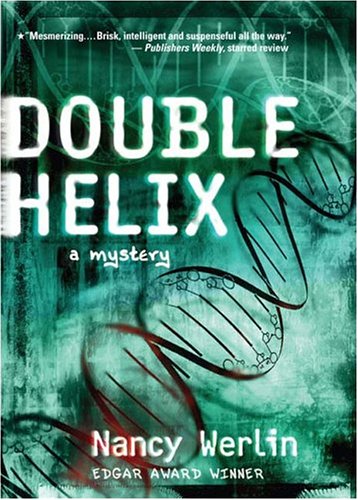All Nonfiction
- Bullying
- Books
- Academic
- Author Interviews
- Celebrity interviews
- College Articles
- College Essays
- Educator of the Year
- Heroes
- Interviews
- Memoir
- Personal Experience
- Sports
- Travel & Culture
All Opinions
- Bullying
- Current Events / Politics
- Discrimination
- Drugs / Alcohol / Smoking
- Entertainment / Celebrities
- Environment
- Love / Relationships
- Movies / Music / TV
- Pop Culture / Trends
- School / College
- Social Issues / Civics
- Spirituality / Religion
- Sports / Hobbies
All Hot Topics
- Bullying
- Community Service
- Environment
- Health
- Letters to the Editor
- Pride & Prejudice
- What Matters
- Back
Summer Guide
- Program Links
- Program Reviews
- Back
College Guide
- College Links
- College Reviews
- College Essays
- College Articles
- Back
Double Helix by Nancy Werlin MAG
Right and wrong are hardly black and white. Especially these days, when the miracles of modern science have taken leaps and bounds in what we can do, understand, and perhaps most importantly, create. And what ethical dilemmas result from such innovations? As the main character of Nancy Werlin's Double Helix explains, one of the Ten Commandments is thou shalt not kill, but where is the line drawn on thou shalt not create?
Eli Samuels is a promising senior who has a lot going for him: a loving and devoted girlfriend, athletic skill, an intelligent mind, and the ability to excel at anything he does. He's salutatorian of his senior class and is surely bound for great things. That may be why when Eli announces that he's not going to college for a year, his father doesn't take it so well.
In a type of domino effect, Eli finds himself drunkenly writing famous scientist, Dr. Quincy Wyatt, a Nobel Prize winner and leader in the field of transgenetics. Suddenly Eli is hired as a lab technician in a world where it normally takes a master's degree to scrub animal cages. And what's more, Dr. Wyatt takes an interest in him … a very personal interest. In fact it seems that Dr. Wyatt is more tied to Eli's past than he knows. Something involving his mother, who has been hospitalized for years with Huntington's disease. Despite his father's wishes and his own qualms, Eli begins to unwrap the genetic mysteries that hold the secrets to who he is … and his purpose.
Double Helix isn't the kind of book you read and then forget. It makes you think. It makes you question. After all, who are we to play God with the rest of the human race? Who are we to decide who does or does not have a right to life? In a world where biogenetics is at the forefront of fields like human cloning and genetic manipulation, we would do well to familiarize ourselves with bioethics. What better place to start than an intriguing and thought-provoking science not-so-fiction novel like Double Helix?
Similar Articles
JOIN THE DISCUSSION
This article has 1 comment.


2 articles 0 photos 2 comments
Favorite Quote:
"If your life's in control, you're not moving fast enough"<br /> - Mario Andretti
Great review, you summed up the crux of the novel perfectly! I loved this novel as well, and it continues to gain relevance as we develop both scientifically and morally. Indeed, it raises many fascinating questions about genetics: who decides who has the right to be born? Is it God? If God does not exist, is it our right to take his place?
If the topics of genetics - and in particular, wrongful birth - interest you, I'd suggest reading Handle With Care, by Jodi Picoult. It is a completely different style, much less dark than Werlins, but her prose is beautiful and the book deals with fascinating moral issues relating to the question of what truly constitutes a "wrongful birth."